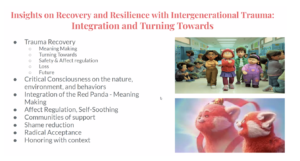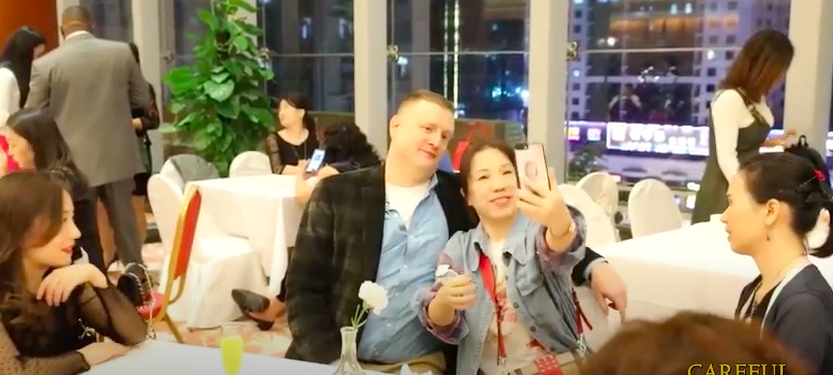On July 14th, 2022, Dr. Esther Hio-Tong Castillo, Founder and Program Director of the Chinese Immigrant Families Wellness Initiative (CIFWI) at the Philadelphia Chinatown Development Corporation (PCDC). Also Dr. Noel Ramirez, Director and Owner of Mango Tree Counseling and Consulting, spoke in a webinar about Asian American Womanhood and Resilience.
This webinar was hosted by the Pennsylvania Care Partnership. Here, they discussed themes relating to Asian American women and their gender identity, culture, mental wellness, intergenerational trauma, and resilience.
Dr. Castillo initially discussed the different types of violence against AAPI women, that have occured in different social contexts. She highlights the laws that were enacted that targeted AAPI communities, such as the Page Law 1875, Chinese Exclusion Act of 1886, Alien Land Law, and the incarceration of Japanese Americans in 1942 to 1946 during World War 2.

She continues to discuss the historical elements of violence of Asian women, as it relates to colonization, world wars, and Southeast Asian wars where they were taken as sex slaves. She notes how the ongoing issues of violence towards Asian women include sex trafficking and how Asian women are seen to be “hypersexualized, fetishized, and submissive for White men.”
Dr. Noel then discussed generational trauma, as this is common in immigrant Asian families and relates heavily to the film “Turning Red”. He states, “broadly defining intergenerational trauma, there’s this really beautiful graphic from an Instagram content creator that looks at the critical incidences and moments of intergenerational trauma, war, violence…colonization, partition in South Asia, slavery, World War 2, and how generationally, that level of trauma significantly impacts not just one generation but is constantly passed down to the rest.” He added, “PTSD in one generation can result in alcoholism, emotional repression, and hyper sexual behavior, in another generation.”
He then discussed how history plays a role in intergenerational trauma, as colonization leads to pain and traumas being passed from generation to generation. He stated, “our history is intertwined with colonization, ‘orientalism’ ‘foreign’ ‘enemy of the state’ and the way ‘ China is framed as the enemy of the US’ are ways that racism persists.”
Dr. Noel then highlighted the issues with being an Asian immigrant in the US, as the difference in the individualistic and collectivist cultures need to be navigated in the AAPI community. He stated, “You come to a place outside of your home land…so what we see are two different frameworks existing on a continuum, with global identities. Here we are navigating between the two frameworks.
With ‘express yourself,’ children think in terms of autonomic decisions, self-actualization, the ‘me and who I am’ occupation mobility is higher, as well as the individual identity. However, pride and shame are prevalent in collectivist cultures, there is more interdependence on a “we”, relationships are more formalized, ‘my mom is my best friend’ compared to ‘my mom is the warden’, where disgrace and honor are more prevalent, and you are indebted to your parents. There is a continuum.”
After this discussion, Dr. Ester and Dr. Noel continued with an analysis of the Disney film “Turning Red”, which encompassed most of the latter half of the session. They showed clips from the film in order to discuss several themes as it relates to the Asian American female identity. To start, they discussed filial piety.
Dr. Castillo shared, “‘Honor our parents, make them proud,’ these narratives get integrated with most Asians being the “model minority,” with the pressure to succeed being prevalent in immigrant families. It is also hijacked in US politics, describing Asians as monolith. This is why we feel that pressure, it flattens the dimensionality, justifies a lot of our oppression, and creates a lot of depression and anxiety.”
Dr. Noel then adds, “the fear of bringing dishonor to your family, the debt of the inner self, you’re constantly charged to pay back this debt of your life. Your life is a series of payments. In ‘Turning Red’, the mother struggles with the other mother’s expectations, filial piety, and the magical place that these people come to is the psyche. Where the injury is the inner child, the trauma is with you, and you carry it within you.”
Dr. Castillo continues the discussion, as she highlights how the film portrays the cultural pressure for females within the AAPI community to remain “presentable” and “perfect”. He notes, “healing the inner child is important, these expectations are important, these strict parenting, expectations for the child to be perfect, something very specific to being Asian woman relates to the pendants in the film, where you need to suppress parts that are ugly to be looked as perfect. To represent yourself as looking good, and failure to do that will bring dishonor to your family. We see there is an absence of this in men, and is mostly seen from mother to daughter.”
Tying the discussion back to the theme of intergenerational trauma, Dr. Noel then notes, “The red panda falls, which is part of the curative factor of intergenerational trauma. Through the Fourtown reference, the friends of Mei, they create resilience in intergenerational trauma which revolves around healing.” Here, he noted how community/familial support, radical acceptance, shame reduction, and honoring the trauma with context all play a role in healing oneself from our generational trauma. It is with these components that can lead to more hope in providing better mental wellness for the next generation.

After analyzing the film, “Turning Red”, Dr. Noel and Dr. Castillo then discussed how stigmatized mental health issues are in the AAPI community. Dr. Castillo stated, “drugs and alcohol are extremely stigmatized, domestic violence as well. It is very common in the community we serve. Just because you don’t hear it doesn’t mean it doesn’t exist…Mental health issues in the AAPI community are very unreported…there are general problems with research and awareness at the entire societal level. On a community level, much has to be done to destigmatize and provide services culturally relevant and create safe spaces where people can talk about these issues.”
Dr. Noel concludes, “In addition, the Philadelphia Mental Health System is not equipped for Asian American clients…we’re talking about things like folks who aren’t documented, access to insurance, language capacity is just not there…the way in which mental health is trained is very westerned. It doesn’t account for a very collectivist framework and structures…The systems in place are not equipped for AAPI communities, hopefully that can change with more capacity building.”


трагедия с саакашвили, саакашвили
сейчас демоны хранители знаков
зодиака, демон шехирирон к чему снится котенок на шее
раху в рыбах во 2 доме, раху во 2 доме в козероге таро ньюс расклады
I am genuinely happy to read this website posts which contains tons
of valuable facts, thanks for providing these statistics.
джетком вакансии москва компания digital вакансии водитель вахтовым методом в хабаровском крае вакансии
режим работы магазинов пятерочка в адлере вакансии на авито в митино